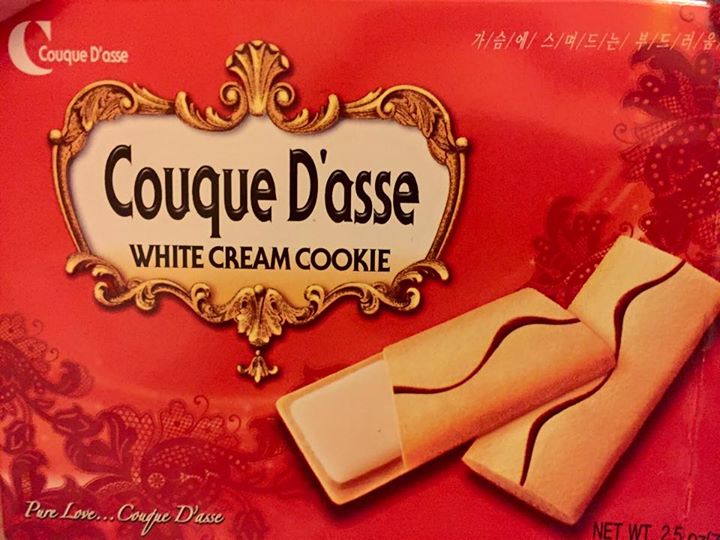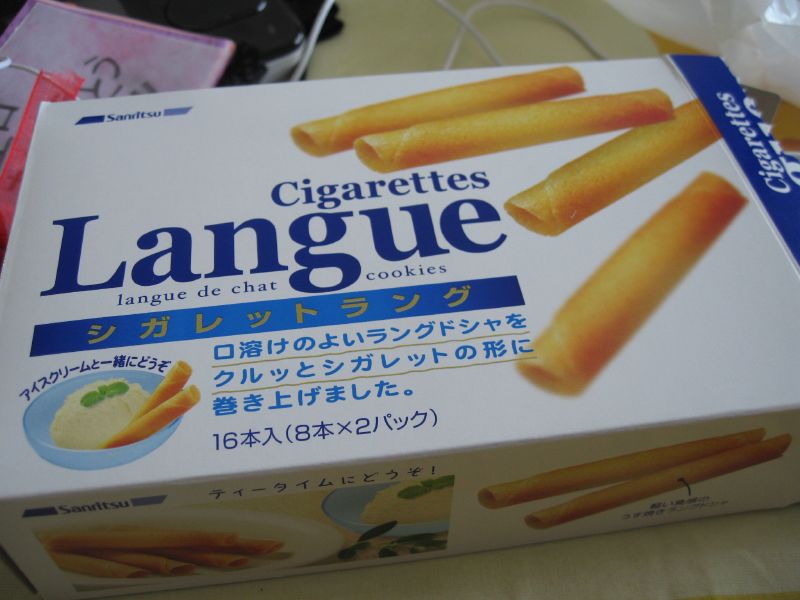Couque D'asse
« previous post | next post »
Nathan Hopson sent in this photograph of a package of cookies:
There's even a Korean version on Amazon.
쿠키의 명작 ku-ki-ui myeong-jak, RR; k'u-k'i-ŭi myŏng-jak, MR ("the masterpiece of cookies")
쿠크다스 Kukeudaseu, RR; K'uk'ŭdasŭ, MR)
But what language is it originally? Norman? "Langue de chat"? Note the addition of "s" at the end of "D'asse" in this version.
Trying to dig a little deeper to see who is responsible for the Frenchified wording, it seems that a company called Sanritsu is often involved with this type of cookie. Never mind that Sanritsu is either a conglomerate that makes everything from machinery to electronics, video games, and cookies, or several companies with the same name that make all sorts of products, when I did an image search on Sanritsu couque, I found that the full name of their "Couque" usually has an "s" at the end, "Couque D'asses", though sometimes they forget the "D'" and it just comes out as "Couque asses". But the related Sanritsu product that really floored me was "Cigarettes Langue".
I would not have known what to make of "Cigarettes Langue" had I not noticed in the fine print that, as with "Couque D'asses", this is a kind of "langue de chat cookies". Fortunately, this led me to a most curious inaugural blog post, titled simply " The First Post" (7/5/07), which explains the name, the ingredients, and practically everything else you need to know about "Cigarettes Langue".
This appeared on a delightful food blog from Singapore called s p o o n e r i s m s * i n c. They don't seem to have been active since around 2009, but I'm grateful that someone is keeping the old posts online.
Since this is Language Log, here are the equivalents of "langue de chat" in several other languages:
"kočičí jazýčky" (Czech), "Katzenzunge" (German), "lingua di gatto" (Italian), "língua de gato" (Portuguese), "Macskanyelv" (Hungarian), "cat tongue" (English)
A final note: "Asse" may not be what you were thinking it was, but rather the name of a Belgian town (I'm guessing), where I suppose there are some good bakers, though, alas, they speak Flemish, not French.
Bon appetit! These "Couques" come with "Pure Love", as is noted on many of the packages.
[Thanks to Haewon Cho]


Laura Morland said,
April 19, 2015 @ 9:53 pm
The company is, sadly, conflating two kinds of French cookies. Here are some authentically French "cigarettes" (presumably made without "pure love"): https://estrip.org/content/users/ladycroft/0109/Cigarettes0128.jpg
And here are some "langues de chat," which do actually resemble a tongue, more or less: http://www.bakersandlarners.co.uk/uploads/images/products/product_1777_large.jpg
Still, it's interesting to know that Sanritsu wants to gild its products with French style!
phspaelti said,
April 19, 2015 @ 10:15 pm
Some random comments here:
Couque D'asse may be trying to take some from "Häagen Dazs", which frankly is no less strange than any of these names.
Pseudo-French of this kind is pretty common in Japan.
The "Cigarettes Langue" are a type of cookie that is usually known as "Cigarettes Russes". So I guess it's a mash-up.
And then there is the Swiss color pencil maker who has long used the brand name "Caran D'Ache"
Keith said,
April 20, 2015 @ 12:45 am
‘Couque’ is a term used in French speaking Belgium for what we would in the UK call gingerbread, of the loaf kind, not the flat biscuit. It looks like a transliteration of the Flemish , 'koek'.
Vilinthril said,
April 20, 2015 @ 3:09 am
“Katzenzungen” in German are a completely different kind of product, made of pure milk chocolate:
https://de.wikipedia.org/wiki/Katzenzunge_%28Schokolade%29
BlueLoom said,
April 20, 2015 @ 8:25 am
@phspaelti:
I wonder which came first, the Russian word карандаш (pencil) or the Swiss pencil manufacturer.
Aha! WikiP to the rescue:
http://en.wikipedia.org/wiki/Caran_d%27Ache
Jongseong Park said,
April 20, 2015 @ 8:51 am
As a Korean, I've of course been familiar with 쿠크다스 kukeudaseu since my childhood, but have never really thought about where that name came from and even from which language. Now that I live in France and speak French, Couque d'Asse makes perfect sense, even if it does lead to inevitable snickering from English speakers. Wouldn't be the first time that something from the Flemish-speaking part of Belgium is known by its French name either.
Asse being a town in Belgium, the correct capitalization should be Couque d'Asse, but the Korean version from Crown Confectionery uses Couque D'asse, as the finer points of French capitalization are understandably lost on most Koreans. Sanritsu uses Couque D'asses (biscuit of Asses), which is the wrong plural—it should be Couques d'Asse (biscuits of Asse) in French. The first photo above is of a package from the Korean Crown brand (the C in the upper-left corner is from the Crown logo), not the Japanese Sanritsu brand.
Norman Smith said,
April 20, 2015 @ 10:05 am
When I saw, "But what language is it originally? Norman?" I wondered, "Why is the author asking for my opinion?" Alas, 'twas not so.
AlexB said,
April 24, 2015 @ 7:23 am
Couque (from the Dutch/Flemish) koek, indeed, can refer to different kinds of pastry in Belgian French, most famously (or infamously) the Couque de Dinant. However, having spent all my life in the Brussels area, I've never seen anything like this alleged 'couque d'asse' before. It must be a pseudo-belgian speciality.